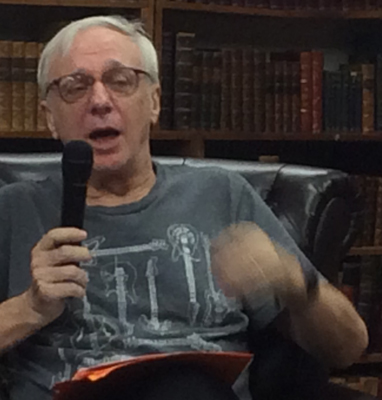Robert Christgau

August 2015 edition of Perfect Sound Forever
Like its predecessors (2008 & 2011), the third NYU/Tisch Clive Davis Institute of Recorded Music edition of Perfect Sound Forever is dominated by final papers, mostly by sophomores, in my required Artists and Audiences history and writing course. The ringers are papers written for the '50s Rock and Roll course I taught in the spring, two of them are also by sophomores (from Steinhardt and Gallatin) and one of them by a ReMu senior. As before, I think these students have done critical work that deserves the kind of public presence PSF can provide -writing at least as good and often better than professional work I've edited.
Chris Conway's succinct argument for the greatness of Ringo Starr puts that discussion to rest. Charles O'Neill's breakdown of Bo Diddley's rhythms is a worthy successor to Robert Palmer's pioneering exploration. There are disgracefully few academic papers about Chuck Berry, but I'd sooner teach Jake Chapman's songwriting guitarist's view than any of them. Thomas Collins takes a more schematic look at Berry's poetics, if that's what they are, than few before him. Madison Love delves into Marilyn Monroe the vocalist. Julie Hanse provides the first substantial discussion in English of the seminal French band Téléphone.
Since most good criticism is personal whether it admits it or not, several of these pieces take advantage of that academic no-no the first person, as my students are always permitted and sometimes encouraged to do. But others are even more candidly personal. Adrian Carter's encomium to Chuck Berry is rooted in the first CD he ever owned -a Berry comp he got for Christmas when he was seven. Jack Hallenbeck does for '80 breakout Prince what Sarah Beilenson does for '90s breakout Liz Phair -explain an artist now viewed as archival or historic in terms the millennial generation can understand. Claire Bufalino closes ReMu's PSF by addressing Katy Perry as a friend with whom she shares a spiritual struggle. And Annie Kissiah and Priscilla Bajomo (who have Eminem and OutKast essays waiting in the wings) open it with complementary hearings of Flying Lotus that are objective in form but exemplify how individual our responses to any artist of substance are. That's why I'm committed to getting as much good criticism as possible out there.